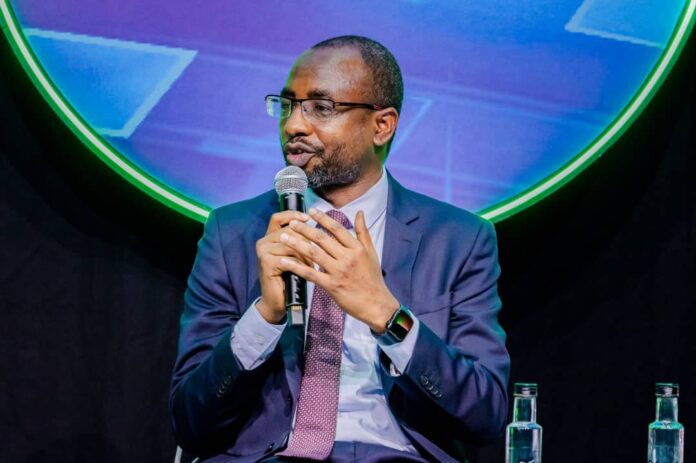Inuwa and NITDA’s golden era
By Lawal Jet Kaugama
TECHDIGEST – Since Kashifu Inuwa Abdullahi was appointed as the Director General of the National Information Technology Development Agency (NITDA) in August 2019, the face of digital technologies in the country has
changed for the better. Inuwa is one of Nigeria’s well-educated, world-class technocrats who came to public service to help change the narrative in the information and digital economic sector.
In the years Inuwa assumed office as NITDA DG, his watch words have heen hardwork, efficiency and dedication. Nigerians are happy for his appointment. His patriotism boltered by his penchant for IT advancement pushed him to huge achievements in office. As a believer in a knowledge-driven economy, his initiatives in the office are to see Nigeria develop her economy through digital technologies in an unprecedented manner.
This is a man who demonstrates that IT is a source of inspiration which can be harnessed to developing new business value chains for Nigerians.
Inuwa’s visions and initiatives at NITDA have proved that Nigeria is
capable of becoming Africa’s largest digital economy, with its abundant human and material resources put to use in a right way.
The NITDA boss is bent on implementing the agency’s strategic roadmap for the
development of Nigeria’s IT sector envisioned by Minister of Communications and Digital Economy, Professor Isa Ali Pantami, bearing in mind that this sector is where President Muhammadu Buhari’s core vision for Nigeri’s Economic Recovery and Growth Plan (ERGP) programme hinges.
NITDA, under Inuwa, has mapped out a Strategic Roadmap and Action Plan (SRAP) 2021-2024, which the agency has identified as the pivot of digital economic growth and development.
He has spoken extensively about the pillars captured in the SRAP, as it relates to developmental regulation, digital literacy and skills, transformation, innovation and entrepreneurship as well as cybersecurity and emerging technologies even as he encourages local contents in the ICT subsector.
He ensures that Nigeria maintains an automated IT project clearance
(ITPC) and creation of user accounts for Ministries, Departments and Agencies (MDAs). In this way, he has saved billions of naira for the Federal Government.
Inuwa’s coming to NITDA after Prof. Ali Pantami is one of the most viable and suitable appointments in the present government. It has been reported that he has continued with the visionary leadership of Prof. Pantami in the area of implementation of the Nigeria Data Protection Regulation (NDPR), which resulted in the establishment of the Nigeria Data Protection Bureau (NDPB).
This singular action action has drawn the attention of the international community to NITDA, thereby earning the agency the
position of vice chair of the African Union Policy and Regulatory Initiative for Digital Africa (PRIDA).
Inuwa, a man not on the-job-training, knows the ABCs of ICT sector and its
challenges that are stalling Nigeria’s march to the evolving world of digital economy.
READ ALSO: NITDA Wants Tertiary Institutions to Produce Tech Savvy Graduates
Under Inuwa, NITDA has developed several regulatory frameworks for IT development. These frameworks have been acknowledged by countries which are asummed to have grown far in the ICT technologies .
Read Also:
He integrated ICT to underserved areas and cities to develop human capital and provide universal access to knowledge to create a knowledge-based economy.
Early in 2020, the outbreak of COVID-19 pandemic presented a major challenge to Nigeria and other countries across the globe. Inuwa faced the challenges squarely by constituting a Tech4Covid Committee that explored measures to be deployed in cushioning the economic effect of the pandemic on Nigeria’s digital sphere. The committee crafted a strategy that would later ensure the retention of about 100, 000 ICT jobs and the creation of additional 30,000 jobs in the post-COVID-19 era.
Also, Kashifu’s tenure has uncovered and unfolded the potential in Nigerian
farmers through government’s initiative of National Adopted Village for Smart Agriculture (NAVSA), which aimed at changing the face of the agricultural communities in the country.
This initiatives help farmers and other agricultural businesses navigate their way across the agricultural value chain.
Crop farmers were trained and empowered with digital devices and seeds’ funding, which also created further value chains in rural enterprises thereby creating jobs in the country.
NITDA also launched the National Adopted School for Smart Education (NASSE) to promote digital literacy and skills. Here more than 500 students and 30 teachers in junior secondary schools in Abuja have benefited from the programme. Also, the agency supervised the training of thousands of artisans across the six geo-political zones on digital literacy and phone repairs.
Women and people living with disabilities are not left out of the euphora of Inuwa’s innovaions.
Inuwa, a man who do not believe in half-done job, established hundreds of ICT parks and community ICT centres, equipped with world-class facilities across the 36 states of the federation and FCT.
NITDA established the National Centre for Artificial Intelligence and Robotics (NCAIR) to drive and support the research, development and adoption of emerging technologies in the country that has created the required environment for Nigeria’s teaming youth population.
As a result of NITDA’s excellent performance in the IT sector, the agency received the prestigious National Productivity Order of Merit (NPOM) award from President Muhammadu Buhari.
Inuwa as a Massachusetts Institute of Technology graduate trained strategist with 18 years of cognate experience in IT
operations, business transformation and solution architecture, across both private and public sectors.
The rich CV of NITDA boss shows he was well grounded in the job.
NITDA has continued to raise the bar of excellence through the numerous services it renders.
In an interview, Inuwa said NITDA’s major priority is the implementation of the National Digital Economy Policy and Strategy towards achieving 95% digital literacy by 2030, achieving 95% broadband coverage, making Nigeria a startup nation, and getting Nigerians to create and capture value from emerging technology.
A report by the National Bureau of Statistics (NBS) indicates that Nigeria’s ICT sector contributes 18.44 percent to the GDP in the second quarter of 2022. The figure was an improvement from the 15 percent performance recorded in the last quarter of 2021.
The NBS data shows that the
ICT sector’s contribution exclipses the figures recorded by oil and gas, manufacturing, real estate, and financial and insurance.
Indeed, under Kashifu Inuwa, NITDA is in its golden age.
Kaugama writes from Dutse, Jigawa state.




















